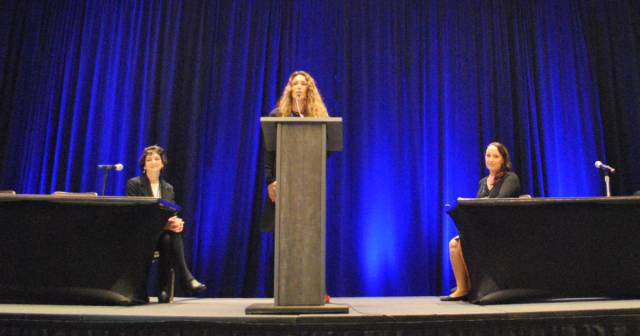You are here
Championing Health in Communities Nationwide
It was my privilege to attend the 2022 National Adult and Influenza Immunization Summit (NAIIS) in Atlanta earlier this month to accept the “Health Equity & Access Immunization Champion” award for the CDC Foundation’s ongoing work on the Partnering for Vaccine Equity (P4VE) program.
The P4VE program was created by the CDC to provide funding and support to a network of national, state and local organizations working to improve vaccine access among groups who experience disparities in immunization.
In April 2021, when the CDC Foundation first received P4VE funding from the Centers for Disease Control and Prevention (CDC), the COVID-19 vaccines were still relatively new. Vaccination rates were lagging, particularly among communities marginalized by long-standing health and social inequities. To make matters worse, misinformation about COVID-19 and the vaccines was rampant.
In the face of these challenges, we were tasked with implementing a program that would increase vaccine education, access and acceptance in groups that were not receiving fair and equitable opportunities for vaccination—including racial and ethnic minority groups, persons with disabilities, rural populations and other groups who are medically underserved.
We began by forging partnerships with 100 community-based organizations (CBOs) across 33 states. These organizations are trusted resources with long-standing relationships in the neighborhoods they serve. This allows our CBO partners to develop unique, locally-focused vaccine outreach that cuts through misinformation and distrust.
To support the CBOs, the CDC Foundation also created the Vaccine Resource Hub—an online repository of free educational materials about COVID-19, influenza and other adult vaccines. The site serves as a “one-stop shop” for organizations and the public to access accurate, up-to-date resources and information about vaccines in over 50 languages, and it offers inspiring stories about the diverse and innovative work of the P4VE-funded organizations.
In addition, the CDC Foundation partnered with five national and regional social media organizations to address misinformation about COVID-19 and the flu. These organizations work with the P4VE CBOs to ensure they are aware of the latest misinformation trends and can address them accurately and effectively.
Our partner CBOs have also formed relationships with local public health departments, hospitals and other vaccine providers, creating more opportunities for people to access vital health information and vaccines in places they feel most comfortable, including barber shops, churches and local businesses. P4VE-funded CBOs have established 2,800 regional partnerships and hosted over 6,500 events, resulting in more than 145,000 COVID-19 and influenza vaccines in the first year of the project.
These are astounding numbers, reflecting the personal dedication our CBO partners have brought to this challenging work. Whether it is by providing vaccine opportunities to hundreds of people at a neighborhood gathering, or by simply taking the time to listen to the concerns and struggles of one person—these organizations work tirelessly every single day.
This year we expanded our P4VE program, and we now support 115 CBOs representing 36 states and Washington DC. At the CDC Foundation, we have a dedicated team that works alongside our many P4VE partners to ensure that they have access to information, resources and each other. We are honored to support these organizations as they bring their communities together around this important health issue to create positive outcomes that will extend well beyond COVID-19.
The award that I accepted at the NAIIS Summit belongs to everyone doing this daily work, and I was honored to accept it on their behalf.
This project is supported by the Centers for Disease Control and Prevention (CDC) of the U.S. Department of Health and Human Services (HHS) as part of a financial assistance award totaling $22,724,994 with 100 percent funded by CDC/HHS. The contents are those of the author(s) and do not necessarily represent the official views of, nor an endorsement by, CDC/HHS, or the U.S. Government.

